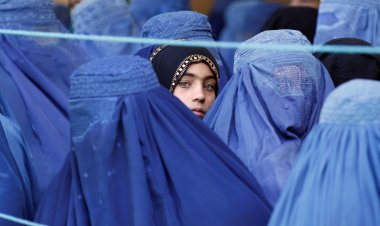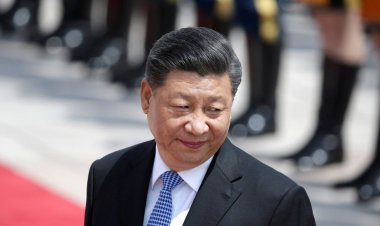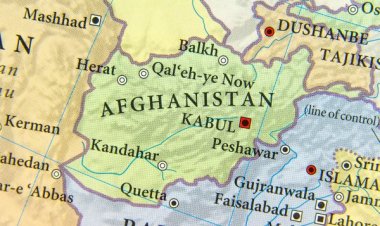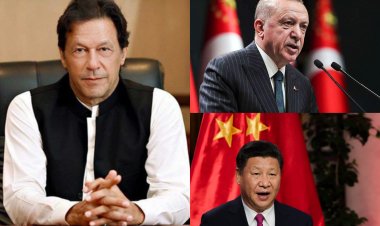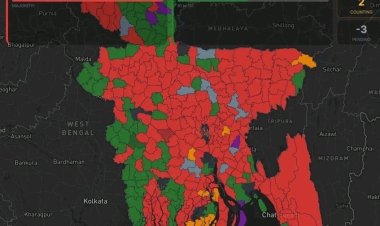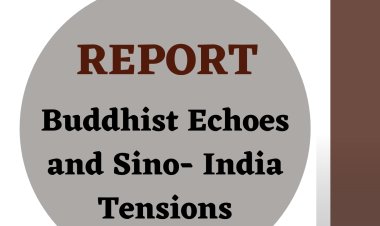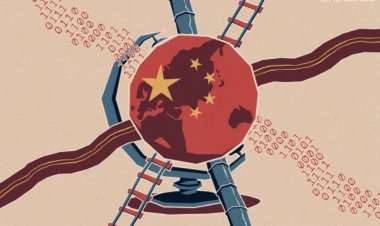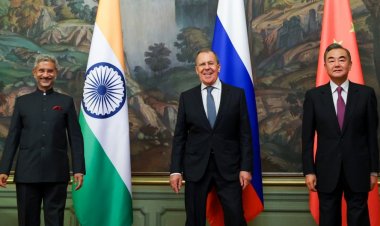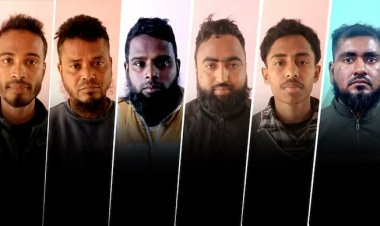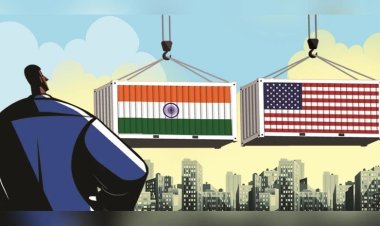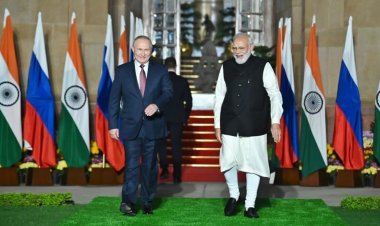Kashmir Dialogues: Interview with Majid Hyderi, Journalist, Strategist and Political Analyst
Majid Hyderi was interviewed by Abhinav Pandya, CEO of Usanas Foundation, in December 2020. The interview delves into various issues that have impacted and will impact Kashmir in the future.
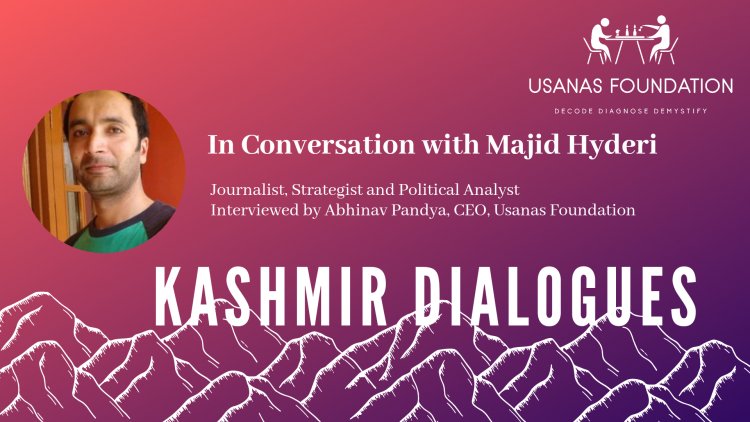
Interview
By Usanas Foundation
Abhinav Pandya
Good evening friends on behalf of Usanas Foundation, I welcome you to the second interview of our initiative called the Kashmir dialogues. It's a project with a mission to try and explore the voices of Kashmir- What the people of Kashmir think has happened in Kashmir, especially after the abrogation of Article 370, and what is going to be the future of Kashmir. Through this initiative of Kashmir dialogues we will be talking to people from all walks of life, from the grassroots, from business, from politics, from journalism, from media and from academia.
Today we have with us, Mr Majid Hyderi. He's a very famous journalist from Srinagar, and was trained as a mechanical engineer, but he made his foray into the world of journalism. He writes for national and international portals on issues related to militancy, radicalization, governance and other political issues. He appears on various TV channels on issues related to Kashmir. Welcome, Mr Majid Hyderi.
Majid Hyderi
Thank you for inviting me to this very prestigious debate on Kashmir.
Abhinav Pandya
Today, in this freewheeling interview, I am going to be asking various questions about your experience in Kashmir and you can share your thoughts and your journalistic findings with us. This is also going to be a great insight for the people who are watching us from abroad, into what is happening in Kashmir. So I will begin with this new chapter which was unfolding in Kashmir with the abrogation of article 370. And I would like you to share, what exactly happened, how was an average Kashmiri feeling when it all happened and how were things managed after this article was abrogated.
Majid Hyderi
The abrogation of Article 370 came as a shock for the people of Kashmir; nobody was expecting that something which has not happened for the last 70 years is going to happen all of a sudden. The state of Jammu and Kashmir was bifurcated and reduced to the status of union territory. The abrogation of Article 370, quite frankly, was planned and implemented so meticulously, that even when you had a lockdown, where there was no communication, there was incommunicado along with the attendant restrictions, the life of the common person did not get hampered. That was the kind of arrangement the government had made. There could have been a ration crisis, food riots could have taken place, but things were planned and managed efficiently by the side of the government. Yes, everybody had problems. When you don't have the internet, you don't have a mobile, you have problems. But what is very important is that human life was not lost. There were no street protests, no killings during this episode and this continued for around six months.
For six months after the abrogation of Article 370, I would say Kashmir had become incident free.However, there were restrictions, it was locked down, there were incommunicado, people had communication problems. Unfortunately they are still continuing.
We still don't have a decent connectivity of 4g. Because of connectivity issues the students are suffering, the people are suffering. When India is striving for 5g and we say it's a Digital India, why keep Jammu and Kashmir away from a decent internet connectivity? The students suffer, the medical field suffers, scholars suffer, everybody suffers, you need to give back this 4g to the people of Jammu and Kashmir. It is very much in need.
Abhinav Pandya
We hear about a very delicate security situation, and right now, after the abrogation of Article 370 a step which is historic in itself, people were expecting that something catastrophic could happen, especially in a place like Kashmir, where we also see a very high level of religious radicalization, and militancy. So what exactly was the reason, besides the security arrangements, that people didn't come out in an open revolt?
Majid Hyderi
Well, firstly, there were too many security arrangements. So people were, I would say, to some extent, frightened at the beginning of when the article 370 was abrogated. But the second aspect is that as I said, the government had meticulously planned and arrested all the forces and elements which could lead the protests and organise disturbances. They were all behind the bars. And some of the outfits were already banned, such as jamaat-e-islami was banned, and some militant separatist organizations were banned. Anybody who was raising their voice was getting arrested and being put back on the bus, not in Jammu and Kashmir but far away from Jammu and Kashmir. So, that kind of a fear factor in the minds of people existed, but then subsequently, people got adapted to this, they got conditioned to this and now, you see that we have, a surprising watershed, in the district development council elections, which were the first elections to be held after the abrogation of Article 370.
There are some issues now which we are facing and which are evolving in the new Kashmir as the honorable Prime Minister has been saying, in his idea of a Naya Kashmir. So what is Naya Kashmir? the government had the idea, they wanted to abrogate 370. But then there are some issues with regards to people of Jammu and Kashmir. They have their domicile rights and other issues. It's not only about Kashmir, even people of Jammu are asking for it, because when you keep a lot of people away from the domicile rights, their tribal characteristics, their ethnicity can never be preserved and secured. So there will be issues and these are issues which need to be resolved in a way that you don't push the people away. And that should be the idea of Naya Kashmir.
Abhinav Pandya
So, my next question would be, how has things been after the abrogation of Article 370? In terms of governance, because the government said that, Kashmir had a massive corruption problem. Besides that the infrastructure is bad, and the government is saying that they will have better employment, better investment, or outreach and governance initiatives will keep going. Do you see any kind of perceptible changes happening, especially with the new Lieutenant Governor joining in Kashmir?
Majid Hyderi
Well, Mr. Abhinav, this is a very, very important question. And this is largely being missed by the mainstream media over the month. I would say I've been a big critic of the government and I always try to be a critic because I'm a journalist. My duty is essentially to criticize the government. But I would say the only good thing which the Modi government has done for Jammu and Kashmir is the appointment of Manoj Sinha as the Lieutenant Governor. He has been dynamic from day one. Everybody appreciates him for his dynamism, he has shown the kind of dynamism which the bureaucrats wouldn't. For the last two years, we had a stagnation in the administrative affairs. There were numerous complaints of administrative failures, such as ruthless corruption. And then at a press conference, I posed the same question, you have corruption in the bureaucracy then why are you not taking action? So now after Malik Saab, we have Manoj ji and I would say that if BJP utilizes his energy in the best way, not only will Jammu people vote for BJP, but even Kashmiri people will vote for BJP, that is the kind of dynamism a man from BJP has shown in Jammu and Kashmir. He started with a visit to a COVID Hospital, when no bureaucrat would dare to go to a COVID Hospital in Jammu and Kashmir. And a few days after that, he goes to an area where one of the longest gun fights between security forces and militants had just taken place. He went for a district board meeting to Baramulla, which is at the frontier side of Kashmir. This has never happened in the last 30 years of armed conflict that you have a head of the state or the union territory, go into some frontier district by road that too after a massive gunfight having taken place.
From the religious perspective, he comes from a right wing Hindu background. Yet, he went to Hazratbal shrine, which is considered one of the most sacred shrines in Jammu and Kashmir, and what was different about him was that he removed his slippers at the main gate, where otherwise everybody wears them. So those are the kinds of gestures he has been showing. He even went to mata Vaishno Devi, he went to districts and he didn't take the bureaucrats along.
He shows this dynamism, he is showing his integrity and honesty, which he has been known over the years. But the problem is with the bureaucracy. They (Lt. governor office) really have to start a strict crackdown on corruption and the scrutiny of how the bureaucrats are working. This problem has been a major reason for people's alienation from New Delhi over the years. But now for the last two years, you have bureaucrats being pampered by New Delhi. So unless you stop the pampering of ‘dynasts’ (traditional political elites) or the bureaucracy, you can't win the hearts of the people. So it is something for New Delhi to look into. Because for a new Kashmir to have sustainable peace and prosperity, you need to make your bureaucrats accountable, both in civil police or administration.
Abhinav Pandya
These are very, very insightful and upsetting thoughts, but I'm getting to learn a lot more. Coming back to your idea of this corruption being a major problem and governance being a major problem. I remember when Mr. Satya Pal Malik was the governor, there was a video, which was played by one of the mainstream TV channels, I think it was Republic TV, in which in Pulwama city, which was a hotbed of militancy, where they got some electricity problem fixed, and people were chanting slogans in the praise of the Gov. Malik. This means that this governance problem has been significantly neglected over the years. My next question is that, what kind of changes do you see in terms of governance and policy measures for better governance in the future?
Majid Hyderi
Well, before getting onto your question, I would just recall that when Satya Pal Malik was the governor. One boy from now North Kashmir had sent a message that we don't have electricity in our village and getting village electricity to their village would take around three four months, but what he did, he got a generator installed in their village, so that the remote area gets electricity. So that is the kind of attitude your governor or the Lt. governors are showing. But then, why did you have militancy in Kashmir, it was essentially because of corruption.
There was a rigging in 1997 which again can be seen as corruption and there has been 70 years of corruption, the common Kashmiri has never benefited the incentives New Delhi has given to Jammu and Kashmir. Not 1000s but lakhs of crores have been spent in the name of Jammu and Kashmir. But where did that money go for the last 70 years, there was no accountability because New Delhi, did not want to make the dynasts accountable. People feel that New Delhi never responded to what they wanted. New Delhi only responded to what the politicians in Jammu and Kashmir wanted, and that was a major barrier between New Delhi and the people of Jammu and Kashmir. But unfortunately, even after the abrogation of Article 370, the same continues.
There is a political vacuum in J&K. However, why should a government where you have prominent faces being honest resort to anything that brings in an element of rigging in elections, or corrupt elections. Recently, at the district government council elections you had a high turnout of these voters that our government, the union ministry and other forces in the government, brought in foreign journalists for coverage. So the government, which was stopping foreign journalists from coming for coverage, is now inviting journalists for coverage. However, in the same elections, you have complaints of rigging, you have complaints of fake vote casting being carried out. On the day of the election, a fake vote casting and fake cordon and search operations (security operation) was staged in where an encounter took place. So why should a government which is known, globally for its honesty, support this kind of corruption in the elections? If you have to win the hearts of the people, you have to do it through elections. So why not have a fair electoral atmosphere in Jammu and Kashmir?
New Delhi had a meticulous plan to abrogate 370 and 35A, but it has no plans for the future. They are grappling for ideas. In DDC elections BJP was fielding B teams (proxies)? Why BJP, if so confident, is not contesting elections with its own team in Jammu and Kashmir?
You can't stop anybody, you can't steal anybody's property, you can't jail some politician just because he is not on your side, everybody should get a free chance. Even if some separatists want to join into the electoral foray, they deserve a fair chance and that will only be possible when you show your honesty in the political spectrum. The people of Jammu and Kashmir are so emotional that if you win their hearts through honesty and optimism, you are going to win their electoral constituencies as well.
Abhinav Pandya
Thank you, so you mentioned that New Delhi is not being able to reach out to the people, and here, I would like to know your thoughts on the role played by the local midstream political parties, the people who we call dynasts. Because after the abrogation of Article 370 when many midstream political leaders were arrested, I was on a tour for my research project and I came across common people literally celebrating the arrest and detainment of the many politicians. They say we don't know whether we are happy or we are not happy. But yes, we know that we have been looted and cheated by the local mainstream politicians and there was an extreme repulsion and anger against them. India is a federal state, there are limitations to the power which the central government can exercise; the states have elected state governments. Would you like to throw some light on the role played by the local Kashmiri politicians, who are the sons of the soil. What exactly happened, why they did not improve the lives of the people and played into the hands of various domestic and foreign anti-India actors.
Majid Hyderi
The regional politicians in Jammu and Kashmir are mostly dynasts. They did get their electoral position in Jammu and Kashmir, but they were always pampered by New Delhi. Also the government should not use terms like dynasts because the same government has had alliances with a dynasts in Haryana. You have your dynasties elsewhere too. This, again, gives a wrong picture to the international community. They are corrupt like politicians elsewhere in the country. You have seen a bridge built in Bihar by the government getting washed up in floods. So you don't have corruption only in Kashmir, corruption is elsewhere too, but the kind of accountability which was needed in Jammu and Kashmir for the last 70 years was never there.
After the abrogation of Article 370 we are left with no gray areas, its either white areas or black areas. However, unfortunately for the last few months, BJP is again bringing back those same gray areas. You had the BJP leaders at the national level saying that some of the Kashmiri businessmen are into relations with dynasts, and with separatists, they were into land grabbing, and then ultimately, the BJP leaders from the National arena came to Kashmir and visited those very politicians and businessmen. The National spokesman of BJP Sanjeev Sharma Ji says that one businessman is a traitor, he is anti-national, he is involved in anti-national activities. And then the next day his own national secretary goes and calls on the same businessman.
BJP needs to set milestones on how Kashmir will go back to the path of sustainable peace and prosperity. There is a need to have a larger plan on how to bring peace. “There is a breach of trust among the people, you need to give them employment, give them an economic package, you don't even have a political package, you're looking for B teams, you need to fill the political vacuum in Jammu and Kashmir.
What is also important is, how you decide your relations with your neighbors, with regard to Kashmir. Kashmir has always been a flashpoint in South Asian politics; you will need to have a policy with your neighbors. Kashmir and Ladakh have become such a problem that you have Chinese aggression on the Indian Territory, there are external factors who have been playing a significant and dominant role in the Kashmir scenario at least for the last 30 years. Kashmir can’t be seen through a pigeonhole. It has to be seen as a part of the larger geopolitics of South Asia. So, the government needs to have part two of the plan. Abrogation of Article 370 was phase one of that plan. What is phase two of the plan is tackling and maintaining Kashmir internally and managing relations with regards to Kashmir externally.
Abhinav Pandya
You just mentioned that there is a major onslaught against corruption in Jammu and Kashmir especially over the last two-three years. A huge Jammu and Kashmir land grab scam is in light, the central government started some kind of inquiry into it. How is this thing being received among the masses, and secondly what is the future of mainstream politics in Kashmir and how do we find new leadership which has real roots ?.
Majid Hyderi
As I said, the government is a bit confused on how to tackle the Kashmir issue, even with regards to corruption. The same government goes to court and nullifies the Roshni land scam, the biggest land scam in Indian history. But then the same government goes to court and says, Sorry, we were wrong, we were confused so kindly come to reconsider your opinion of revoking the Roshni land scam. They arrested the politicians, but the way they were arrested with regard to the abrogation of Article 370 put India in a bad light. The people who were being labeled as land grabbers, BJP is now hobnobbing with the same people.
To give new politicians space, fairness in electoral processes is necessary in Jammu and Kashmir. So if there is a young person who thinks that he needs to join the democratic process,, he now has apprehensions; those apprehensions have come because of the mismanagement by the government.
After this COVID pandemic, the Home Ministry came up with guidelines across the country to have online examinations. But Kashmir is the only place across the country where students were forced by the government to take to the streets to condemn and criticize and protest against the government's decision to hold exams offline.
The government for the last six years has been investing in sports and 200 crores was spent by the previous government in sports, and then BJP leaders in Jammu region held a press conference where they announced ‘khelo India’ (play India) which was a 200 crore package which was in reality ‘looto India’ (plundering India). You give bats and balls to children, but you don't give them jobs, a bat and ball cannot fetch them livelihood and money. This could have been a scholarship for those youth to prevent them from indoctrination?
They are also coming up with a back to village program, which is a two day carnival. However, is governance not supposed to be a 24x7 initiative and endeavor of the government? Why do you need to have a carnival where bureaucrats will be available only for those two days, it is only to have evidence that everything is hunky dory. Governance is not about a carnival. So you need to bring drastic changes, you need to bring drastic changes in the way you control bureaucracy and the administration of Jammu and Kashmir then only you will be able to get back to what you want from Naya Kashmir.
Abhinav Pandya
There's a situation where Kashmiri people think that New Delhi is not doing anything. And New Delhi thinks that we are sending a lot of money, such as 80,000 crore Prime Minister's package and it's all going to waste and the local politicians are not implementing. Whatever grievances you just mentioned, needs a strong look at elements who are involved in the university management, local administration, local bureaucracies, which forms a major chunk of mismanagement of any nation and develops resentment and unrest among the people.
Majid Hyderi
The youth who are undergoing education at the moment in schools, colleges and universities have been alienated by one wrong move of the government of holding their offline exams. They are Kashmir’s first victims and have been alienated. This is not something which has been done by New Delhi, but this is something which needs to be looked into by New Delhi.
Abhinav Pandya
Thank you. I'd like to know your thoughts on the status of Wahabi radicalization in Kashmir. There is a huge following among the kids who are 8 to 10 year old children. That kind of radicalization was something which is totally unexpected from a place like Kashmir, which has been a center of Shaivism, Sufism and liberal Islam. What do you think of this radicalization in Kashmir? Another question. How do you see the increasing role of Turkey in the Kashmir’s religious radicalization scenario and terrorism?
Majid Hyderi
Kashmir has been a conflict zone for over 30 years now. Hence there are multiple versions of radicalization. And yes, one of them is Wahhabi radicalization but this very government has given land to the Trans World Muslim University, belonging to the same sect. Radicalization does not come in Kashmir from a religion it comes from an interpretation of what is happening in Kashmir. What is happening in Kashmir is injustice and saying that there is one particular sect of religion involved, may not be the best way to define it. The Kashmir conflict is a political issue.
Abhinav Pandya
Jamaat-e-Islami was banned. Jamaat e Islami was openly propagating Maulana Maududi’s extremist views. Jamaat e Islami is in fact considered as a South Asian cousin of Muslim Brotherhood. And it has links with Hizbul Mujahideen. I have met people in Kashmir who talk about Jamaat-e-Islami openly terrorizing local people and creating a very strong sense of religious radicalization.
Majid Hyderi
I mean, Wahabi radicalization, is a different school of thought..
Abhinav Pandya
I get your point, but still,I would include Jamaat Islam as a larger advocate of religious radicalization. Wahabi radicalisation is one strain of radicalization just like Jamaat-e-Islami radicalization. I would also like to know your thoughts on the Jamaat-e-Islami radicalization.
Majid Hyderi
The statistics for the last six months show that there has been minimal or no recruitment to Jamaat-e-Islami. This time recruitment comes from Al Badar. Al Badar does not come from Jamaat-e-Islami ideology. .
But yes, Turkey is now a bigger player. It is now a player across the Islamic world and held a parallel Islamic summit with Malaysia; but what they missed there was the participation of Pakistan. Turkey is evolving as a new, I would say, Muslim-binding force across the globe. And that way they do have stakes in Kashmir. However, Turkey is into a different game in the Muslim world; they are unlike the Wahabis in the Middle East. Turkey also has good relations with Iran, Pakistan, Iraq, Malaysia, Indonesia, and now in Bangladesh. So Turkey is not interested in Kashmir only, Turkey is interested in Muslim representation in the poorer countries. Turkey has nothing to do directly with Kashmir as of now. If anybody has to do with Kashmir, it has to be the neighboring states, not Turkey. If they do it is only for the consolidation of their larger Muslim Brotherhood sentiment.
Abhinav Pandya
Thank you so much. We just found out that in the Middle-East, Turkey has been arming a manyIslamic insurgent groups in Libya or in Syria. So there was a talk that likewise, they could have stakes in Kashmir as the local support for militancy is coming down and as you said that the majority has accepted article 370 abrogation and is unbothered. However, Al Badar which is less Pakistani, but more of an Afghan-centered terror group still exists. Could you tell us more about Al Badar, its ideology and why certain terror groups are becoming more active?
Majid Hyderi
See, after the abrogation of Article 370, there has been a change in tackling militancy in Kashmir. The first change was that Hizbul Mujahideen and the Lashkar started going down. Elements like Al-Badar started reviving and another outfit evolving out of this (The Resistance Front)with a new name too came up; which was neither Islamic nor radical. So, when the government of India is planning one thing, there is another thing the militants are planning. There has been a change in the kind of militant attacks which would take place prior to this abrogation of 370 and the kind of attacks you have now, their strategy has also changed. The resistance front is a new secular name, it's a new brand of militancy in Jammu and Kashmir.
On the infiltration front, till the abrogation of Article 370 you mostly had infiltration from the frontiers in Kashmir which is LOC (Line of Control) but now, for the last one year, we have been seeing more infiltration in Jammu region from the international border. The modus operandi of infiltration is also changing. And so are the stakes within Kashmir. You have factors from both the west and east playing a role.
Abhinav Pandya
What surprises us most is that these days we hear of BJP becoming a little more popular in terms of its presence and is also being received at various levels. I have come across people even in places like Pulwama, where local people are joining BJP and even standing for elections. I wouldn't be completely surprised because there is a history which goes back to the era of Vaypayee, who gave the idea of Kashmiriat. So there has been a love-hate relationship between the people of Kashmir and BJP. So how do you look at that?
Majid Hyderi
When you look at BJP as a party, people of Kashmir don't have much against the party except for its communal ideology. Barring that the BJP is a big player and you have seen that in the recent district government elections where BJP played a very tricky campaign in the district government council elections. You had Sayed Shahnawaz Hussein, a Muslim and from the National Party as its main face for campaigning in Kashmir and you had Anurag Takhur as its main face in Jammu. So BJP maintained a kind of a balance, they knew how to do it. But yes, if you take out the communal element out of that party, BJP can be a big player in Jammu and Kashmir politics. But what prevents the people from the Muslim majority region, from showing any kind of affinity, is that they have a communal stand.
If you give the people the choice, for the first time in the last 70 years, to have peace and prosperity, the way people want, BJP has a good future in Jammu and Kashmir. If they go against corruption in Jammu and Kashmir, they will do great. And, this is irrespective of and regardless of what has been BJP's stand with regards to the special status of Jammu and Kashmir.
Abhinav Pandya
Thank you very much. This is with a futuristic perspective and has to do more with the attitude and collective psychology of Kashmiri people. We hear stories of stone pelting and stories of Kashmiri people rescuing army men who are caught in accidental situations. We knew there was a strong Sufi tradition. So how do we revive them? How do we leave the baggage of conflict and rebuild and move towards a better future?
Majid Hyderi
Kashmir is not a Muslim dominated region and Muslims worship not just Allah. For the revival of the Sufi traditions, people have been trying at their respective levels but there is no policy framework for this. It is the government which needs to do something with regards to this as well. It can't come through chaos, the way we have been in Kashmir since the day article 370 was abrogated. If you had a good policy for abrogation, you need to have an even better policy for how to take Kashmir forward. Yes, there will be three important things with regard to that. The youth, the key players to how Kashmiri society works, or how the economy works and the revival of Kashmiri traditions which is essentially rooted in Sufism. And even Shaivism for that matter, it is unity that revives both the traditions.
Abhinav Pandya
So I think we are moving towards the end of our discussion. How do we bring back the Kashmiri pandits and resettle them?
Majid Hyderi
BJP has bigger stakes and bigger accountability with regards to what the party has done for the return of Kashmiri pandits. It should not start through ghettoisation. You need to build the confidence in them so that Kashmiri pandits start returning because they have faith in the government. The land belongs to the pundit community. One good thing about Kashmiri pandits is that they have left Kashmir but they have not abandoned Kashmiri culture. Kashmiri pandits have maintained the kashmiri language and they need to be brought back to Kashmir to revive those traditions as well. And it is a responsibility of the government. Some 25,000 Kashmiri pandits still live in Jammu and Kashmir for the last 30 years of conflict and they have been contributing towards Kashmiri society.
Abhinav Pandya
I would like to know your thoughts on the problem of drug abuse in Kashmir.
Majid Hyderi
In Kashmir, till a few years ago, you had only drug peddling. Drug peddling means a negligible or a nominal sort of a drug syndicate. But now you have a full-fledged drug mafia. You have drug trafficking from Kashmir and now the statistics show that it is linked to narco-terror also. There is also an element of funding present. But the problem is that not much is being done on that front, barring one major historic achievement, which was done by the Inspector General of Kashmir, SM sahay who built the first drug detection center in Jammu and Kashmir which was an iconic initiative. You need that kind of smart policing. Now, people in Kashmir are not smoking ganja, it is heroin. So drugs in Kashmir is now a big, big, big syndicate, which needs to be looked at very seriously by the government.
Abhinav Pandya
How are these drugs brought from Pakistan, how are they smuggled into Kashmir and how does narco terrorism work?
Majid Hyderi
Many of the channels of terror funding have been blocked or they have been put to a kind of scrutiny. So now, this is a new money for terror activities, that is why I said the government needs to look into it. On how these are being brought in, these could be brought in through the same logistics as for other terrorist infiltration activities . So the same modus operandi applies to this as well. There is a proper network of how drugs are brought in and how they are supplied and circulated elsewhere.
Abhinav Pandya
Thank you. Thank you very much Majid Sahib. It was an enlightening discussion. We talked about the nuances of issues like local factors, elections, corruption, governance, the bureaucracy problem, the drug problem and the radicalization problem. I think that these are the issues of Kashmir which need to be addressed. Something beautiful, you mentioned about the Kashmiri pandits and bringing them back. I mean, if a few are doing so well, in Kashmir, it's certainly an inspiration for many Kashmiri pandits to come and visit Kashmir and settle there. And likewise, I feel that even the Kashmiri people should visit various other parts of India, these exchanges and interactions should further flourish. And with this, we would come to the end of this discussion. Once again, thank you very much.
Disclaimer: The opinions expressed in the webinar belong to the panellists and not necessarily to the Usanas Foundation.


